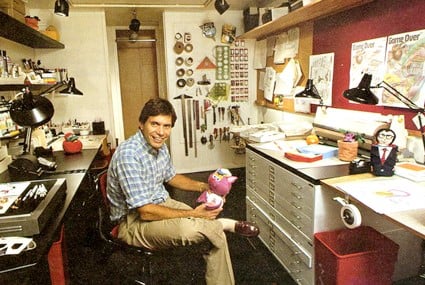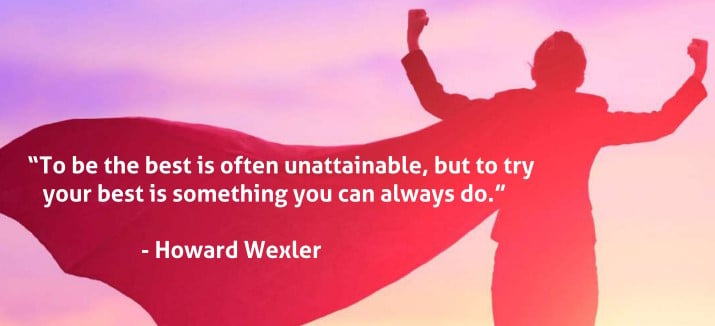
Toy Inventor Howard Wexler [Source: www.howardwexlertoys.com]
There may be an ability to see game play from multiple perspectives including different points of view, while those who win these games are often good at strategy, role play, and pattern recognition. Among game creators, strengths in humor, and divergent and playful thinking are very well-suited to inventing new games.
Some years ago, legendary toy inventor Howard Wexler gave our community a webinar about his life inventing toys. As a kid, he played with Tinkertoys and enjoyed taking things apart.
His toys and games were very different from each other, reflecting his very creative mind.
For example, some of his earliest games involved a James Bond character where players had to undertake challenges. Another was a visual perception game, and another, a “psych-out” game called Black and Blue.
Some of his most successful toys were early childhood toys for Captain Kangaroo (parents do you remember that show?) and Connect Four which is known around the world and has many variations. He’s licensed over 120 games over his career.
Howard’s journey in life was truly remarkable. For the full story, listen to the webinar, but otherwise, here’s a short excerpt:
“I was really as bad as anybody could be. As a student, I was raised in a tenement building on the Lower East Side of Manhattan. No one in my family ever graduated from high school. And my family was not concerned. really about education… teachers treated me as just a kid with lots of problems. You know, I couldn’t read, couldn’t write well, I couldn’t do arithmetic. And I did everything I could to get out of school. And so when I look at my elementary school days, and my junior high school days, I didn’t really learn much at all.”
What turned Howard around in junior high was getting involved in intramural sports. He worked hard at sports and found out he could do well. It was there that he began having “smarter friends” and they motivated him to study harder. They were planning to go to college and he wanted to go, too.
He couldn’t get into the same colleges as his high school friends, but he could go to night school at city college, and that was what he did.
Because his spelling was so bad, he would get by in written tests by writing the first two letters and last two letters of words down clearly.
At the college level, Howard found, his teachers were mainly concerned with his ideas and thinking, and his ideas and thinking were good.
“I pride myself in inventing this kind of idiot writing…this is what I had to do to survive.” — Howard Wexler
Howard not only graduated from college, but he also got a PhD in psychology and that led to his pioneering inventions of activity toys for babies and preschoolers for Hasbro. Up until this time, the only toys for babies were crib mobiles. Howard invented toys for different stages of development that included shakers, an interchangeable crib activity gym, busy box, teethers, soft blocks, curiosity boxes, and simple musical instruments and push and pounding toys.
Howard never had to worry about running out of ideas. If he got a call from Hasbro, Mattel, or Fisher Price saying that they would be visiting New York in two weeks – and asking if he had anything to show them, he would always say yes, even if he didn’t have anything new at the time. Within two weeks, he would have a half a dozen working prototypes of games or toys to show them by the time they arrived.
Later on, Howard went on to teach courses on creative entrepreneurship to high school and college students.
In terms of advice, Howard is a big believe in trying, and to not be afraid to admit failure…and then try something new.

There are many accomplished toymakers who are also dyslexic. One who is also a serial entrepreneur is Reyn Guyer.
Reyn Guyer is dyslexic and comes from a “family of dyslexics.” Like Howard, he is a Toy Hall of Famer, having come up with many different toy and game ideas, like the Nerf ball and the party game Twister. Along with other family members, he also launched a music and educational company.
Many dyslexic inventors and innovators have interests and talents that cross many areas; many also have a keen self-awareness to hire to make up for what they may lack and to also spot talent, even if it’s in its raw form…these can come together to make great startup companies.
To read more about how Reyn put together his early game company visit this link.
The idea for foam balls came when one of their members started throwing foam rocks around at each other. Recalled Reyn, “We had inadvertently created the world’s first indoor ball and broken the parental rule of ‘no throwing balls in the house.'”
The breakthrough was not just that throwing pieces of foam at each other could be a fun thing to do, but that there was no product in the toy market that was using foam balls and that the marketing pitch could be commercially successful.
Reyn and his group were also smart enough to not be dissuaded after Milton Bradley, the company that bought their Twister game, told them they weren’t interested in adding a foam ball to their game and puzzle products. They went to Parker Brothers and that was where he would eventually sign an exclusive contract.
GAME MAKERS – GAME PLAYERS
Having married into a family of avid game players and also having a background in cognitive neuroscience, I’ve definitely grown in my appreciation of game playing and the skills that can come from it.
Young children can be remarkably good at games that older folks can be mediocre or poor at – and it is nice to celebrate their ingenuity and talents outside the classroom.
Sometimes games provide an outlet for complexity and fun that kids may crave.
Sometimes this may lead to their becoming interested in learning coding or more generally, technology.
If you are brooding over which games are right for dyslexic kids – there are few ways to go wrong (except if it requires a lot of spelling – like Scrabble). Strategy- loving kids like classic games like Risk, whereas others may prefer Settlers of Catan or even one of the Monopoly games for budding entrepreneurs.
Creative families and friends also have lots of fun social games to consider – like Apples to Apples or Cranium or Pictionary.
There are also lots of deductive reasoning games (the Clue games, for instance) as well as those that involve building like Jenga or patterns like Howard’s Connect4 or if physical play is what you like to do when you get together with family, then there’s a lot of toys based on Reyn’s Nerf.
When Reyn was asked about the key to his life’s success inventing games, he said it came down to 3 words: “What happens if…” Too often ideas come into mind, but the inventing stops there, but it shouldn’t.
“Don’t sit around and talk about it. Make one, do it.” — Reyn Guyer














